#Conservative government
Text
One thing I can't get my head around, is people hating on refugees because there's "not enough to go around" but, at the same timing voting in the party who allow the top 1% to mass obscene wealth. Some even to the point that they're richer than some countries...
I got news for you about who is taking all the resources, and I'll give you a hint... It's not the people who risk their lives to flee to safety, and who just want enough to live. Just saying...
Maybe you're a "little bit" racist.
It's call divide and conquer honey.
And yes, every single person deserves a home that is not a literal death trap that fire safety wouldn't sign off on. And now has contaminated water, because the floating death trap isn't fit for humans.
"Oh, BuT wHaT aBoUt ThE hOmElEsS". Well yes, you could build them the same kind of suitable accommodation too. Tax the rich. Build affordable housing, and introduce rent control.
Again, guess who is causing that problem, another hint. It's not "the boat people".
#eat the rich#Refugees#Racist#racism#uk politics#Refugee#tories#Conservative government#tax the rich
39 notes
·
View notes
Text

14 years and this where we are.
4 notes
·
View notes
Text
End of An Era
Toryism’s Existential Election

Source: Reddit
By Honest John
AND SO this is it. The end of an era: fourteen years of Conservative rule are, on 4th July 2024, likely to not just to fizzle out, but to result in an unprecedented wipe out of Conservative seats that will leave the Tory Party possibly with as few as 100 seats and without leadership, ideology, direction or purpose. The more extravagant polling models project, in terms of numbers of seats, that the Conservatives could even come behind the Liberal Democrats and be replaced as the main party of opposition to a Labour government presiding over a Parliamentary majority of 200 seats or more. Whereas it is hard to believe the Tory performance will in reality be that catastrophic, the fact that commentators now talk of the Conservative 1997 seat haul of 165 seats, when the Tories were demolished by Tony Blair’s New Labour, as being a good result on 4th July, indicates just how dire Conservative prospects are now considered to be.
This fatalism about the General Election’s result has palpably infected the Tory campaign itself. Rishi Sunak has cut an increasingly folorn figure, and his missteps and misfortune, from his drenched announcement of the date of the election outside Downing Street over a month ago, through his catastrophic decision to leave the D-Day 80th anniversary commemoration early, and culminating in the bizarre story of an insider betting ring within the Conservative campaign itself, seem to symbolise not just Sunak’s personal ineptness, but, ultimately the incompetence, arrogance and corruption that has been present throughout the various iterations of the Tory regime the country has had to endure since 2010. Rarely has an outgoing government been so thoroughly unloved, not just by the electorate as a whole, but also by swathes of its own former support. In numerous vox pops testing the opinion of the public over the last four weeks, the most frequent response from people when asked for whom they are going to vote for in the election is “not Tory”, even in the safest Conservative seats.
The term “end of an era” slips easily off the tongue. Often, despite a change of government, it is often no such thing. Whereas Tony Blair’s and Gordon Brown’s governments did much to improve the lot of ordinary people (notably the huge reduction in child poverty since reversed under the Tories), NHS improvements and inner city regeneration, New Labour nonetheless maintained much of Margaret Thatcher’s 1980s revolution intact. There was no reverse to deindustrialisation; no end to deregulation; no renationalisation of privatised industries and utilities; a continued ideological belief in the primacy of the free market over state intervention in the economy, and a restless and relentless attempt to “reform” public services from the right, introducing internal markets to essential services still in state hands and opening areas such as the probation service and community health services to the private sector. New Labour may have introduced, to a degree, a different set of priorities to Thatcherism, but in its essentials, the neoliberal settlement remained intact. In a different era, Harold Wilson’s incoming government, for all its talk of “technological revolution” remained attached to fiscal orthodoxy and it was its fatal decision to devalue sterling in 1967, that probably ultimately did for its impressive 1966 majority.
Given Keir Starmer’s excruciating caution and his blatant gaslighting when he and Rachel Reeves claim the British economy can be turned around and public services repaired by a combination of spontaneous growth and “reform”, it is perhaps hard to justify the end of era statement. The political philosopher John Gray once described Keir Starmer as a ‘faithful servant of the ancient regime’, referring to what he considers a redundant neoliberal settlement. Despite Labour’s quite radical policies on constitutional reform, workers’ rights and green energy and social democratic positions on economic strategy, housing and public ownership, this is not the Labour Party that has been allowed out on public display this election thanks to dead hand of Morgan McSweeney. This, along with Starmer’s and Reeves’ slightly odd emphasis on “stability” as their headline, gives credence to the Gray critique and perhaps, in his heart of hearts, the ever-opaque Starmer would quite like to administer a neoliberal regime quietly and efficiently with a few leftish tweaks along the way; his problem will be he won’t be allowed to because, quite simply, that settlement no longer exists.
The probable electoral collapse of the Conservative Party next month will simply be the end game of the final implosion of Thatcherism, that probably began as long ago as 2008, when the financial crash pumped toxic debt into the advanced economies, and caused the “globalist” market economy to retract in its very first iteration of sovereign currency and national industries protectionism. However, the so-called “social democratic” moment did not arrive and Brown’s neoliberal government slid from power as the Conservatives and Liberal Democrats combined to use the debt crisis as an excuse to inflict a hyper-Thatcherite assault on public services’ funding. This was the start of fourteen years of performative Thatcherism under the Tories - an exaggerated version of the Iron Lady’s creed that emphasised public spending cuts and tax cuts for the wealthy above all else, choking off growth to the British economy, stagnating living standards and fatally undermining the long term viability of public services. And of course it didn’t work. The whole austerity experiment, a bargain basement travesty of the original Thatcherite ethos, did nothing except provoke the revolt of its victims - principally the deindustrialised communities of the north and Midlands - that culminated in the Brexit vote. Despite Theresa May’s and Boris Johnson’s anti- austerity words, neither did anything to put right a decade of devastating cuts. Instead they contrived to ensure Britain’s exit from Europe was as hard as possible - under pressure from the peculiar nationalist-Thatcherites of the European Research Group, hoping to create a low-tax, deregulated hedge fund managers’ paradise on the Thames.
The economic illiterates of the ERG failed to appreciate that outside the neoliberal EU, Thatcherite ideology no longer made any sense. Outsourced services and foreign-owned British businesses could work within the risk-shared environment of the EU, but outside the Union, the need for an active state to manage and stimulate the British economy is essential - something that Johnson recognised with his “levelling up” agenda. And who put a stop to all Johnson’s half-hearted attempts to deliver on his promise to the first-time Tory voters of 2019? His Thatcherite Chancellor, one Rishi Sunak.
It is perhaps appropriate that the last hurrah of British neoliberalism had a clownish aspect. The crazed turbo-charged Chicago Economics of Liz Truss caused real damage and in many ways it was the culmination of an arrogant selfish ideology, posing as a means of growth, when its barely concealed real agenda was to make the very rich even richer. Trussonomics was Thatcherism as caricature and the electorate have never forgiven the Tories for Truss. Sunak’s attempt to pull the Conservatives back into the realm of serious politics was hobbled by his personal and his party’s continued adherence to this busted model. In the face of ever-growing NHS waiting lists, underinvestigated crimes, a social and long term care crisis and sewage in water, Sunak has no answer, because this societal breakdown is the logical extension of a small state, low tax model pushed to its extreme, and in which Sunak still believes.
And so the 2024 General Election is momentous for two reasons. One will be the redrawing of the political map across the United Kingdom and the vanishing of blue seats the length and breadth of the country. The other however is that, unusually in British elections, this changing of the political guard coincides with the collapse of the accepted economic ideology that has dominated the U.K. for at least 37 years. The task of an incoming Labour government, probably with a majority sufficiently large it will be in office for two, possibly three terms, will be to define a new modern version of a social democratic settlement that rebuilds public trust in the ability of politics to change people’s lives for the better; that restores a devastated public realm, and which guides Britain economically in a way that simultaneously repairs our trading relationship with Europe while at the same time seeing off far right populism.
Keir Starmer may appear to be an unlikely looking tribune to pull off the greatest political feat since his Labour predecessor Clement Attlee surveyed the wreckage of Britain in 1945. If he succeeds, he will go down in history as one of the great Prime Ministers in British history; if he fails, he may be midwife to a new and dark authoritarian populism that will shake British democracy to its foundations. As modern Toryism finally reaches its existential moment and the end of its guiding philosophy, can Starmer’s Labour create a reinvented era for British social democracy to replace Thatcherism? The stakes for the future of this country really are that high.
29th June 2024
#british politics#conservative government#keir starmer#rishi sunak#next general election#labour#end of the tories#liz truss#boris johnson#labour party
4 notes
·
View notes
Text

3 notes
·
View notes
Link
Wow. This has to be the most self-pitying, and egocentric resignation statement ever.
No contrition, or even the slightest acknowledgement of any wrongdoing. Just a whole load of nobody loves me, everyone hates me, i’m going to the garden to eat worms.
#boris johnson#british politics#tory party#conservative party#tory government#conservative government
17 notes
·
View notes
Text

#caroline lucas#political twitter#public order bill#police bill#conservative party#conservative government#uk news#uk politics#uk law#liz truss#police state
37 notes
·
View notes
Text
Significant drop in migrant visa applications following modifications
Significant drop in migrant visa applications following modifications #Conservativegovernment #healthsector
#Conservative government#health sector#Home Office#immigration drop#international workers#Net migration#salary threshold#skilled workers#student visas#UK visas
0 notes
Text

Political and documentary photography posters from the 1970s
In the late 70s, the cash-strapped Half Moon Gallery in London developed an innovative approach to getting its shows seen. Showcasing socially engaged photographers such as Daniel Meadows, Janine Wiedel and Philip Jones Griffiths, it laminated their prints and shipped them by rail as touring exhibitions.
Political Photomontage, a DIY Guide, 1983. The rediscovery of John Heartfield’s anti-fascist photomontages of the 1930s led to new forms of visual protest against Margaret Thatcher’s Conservative government. David Evans and Sylvia Gohl played an important part in introducing photomontage theories and approaches to British audiences, with several exhibitions and publications.
Photograph: ©Rhinoceros
#©Rhinoceros#photographer#political and documentary photography posters#half moon gallery#london england#social engaged photographers#political photomontage a diy guide 1983#john heartfelt#anti-fascist photomontages#visual protest#margaret thatcher#conservative government#david evans#sylvia gohl
1 note
·
View note
Text
For years, the people of the Kitasoo/Xai’xais First Nation watched over their waters and waited. They had spent nearly two decades working with Canada’s federal government to negotiate protections for Kitasu Bay, an area off the coast of British Columbia that was vulnerable to overfishing.
But the discussions never seemed to go anywhere. First, they broke down over pushback from the fishing industry, then over a planned oil tanker route directly through Kitasoo/Xai’xais waters.
“We were getting really frustrated with the federal government. They kept jumping onboard and then pulling out,” says Douglas Neasloss, the chief councillor and resource stewardship director of the Kitasoo/Xai’xais First Nation. “Meanwhile, we’d been involved in marine planning for 20 years – and we still had no protected areas.”
Instead, the nation watched as commercial overfishing decimated the fish populations its people had relied on for thousands of years.
Nestled on the west coast of Swindle Island, approximately 500km north of Vancouver, Kitasu Bay is home to a rich array of marine life: urchins and abalone populate the intertidal pools, salmon swim in the streams and halibut take shelter in the deep waters. In March, herring return to spawn in the eelgrass meadows and kelp forests, nourishing humpback whales, eagles, wolves and bears.
“Kitasu Bay is the most important area for the community – that’s where we get all of our food,” Neasloss says. “It’s one of the last areas where you still get a decent spawn of herring.”
So in December 2021, when the Department of Fisheries and Oceans withdrew from discussions once again, the nation decided to act. “My community basically said, ‘We’re tired of waiting. Let’s take it upon ourselves to do something about it,’” Neasloss says.
What they did was unilaterally declare the creation of a new marine protected area (MPA). In June 2022, the nation set aside 33.5 sq km near Laredo Sound as the new Gitdisdzu Lugyeks (Kitasu Bay) MPA – closing the waters of the bay to commercial and sport fishing.
It is a largely unprecedented move. While other marine protected areas in Canada fall under the protection of the federal government through the Oceans Act, Kitasu Bay is the first to be declared under Indigenous law, under the jurisdiction and authority of the Kitasoo/Xai’xais First Nation.

Pictured: "In some ways, I hope someone challenges us" … the Kitasoo/Xai’xais stewardship authority.
Although they did not wait for government approval, the Kitasoo did consult extensively: the declaration was accompanied by a draft management plan, finalised in October after three months of consultation with industry and community stakeholders. But the government did not provide feedback during that period, according to Neasloss, beyond an acknowledgment that it had received the plan...
Approximately 95% of British Columbia is unceded: most First Nations in the province of British Columbia never signed treaties giving up ownership of their lands and waters to the crown. This puts them in a unique position to assert their rights and title, according to Neasloss, who hopes other First Nations will be inspired to take a similarly proactive approach to conservation...
Collaboration remains the goal, and Neasloss points to a landmark agreement between the Haida nation and the government in 1988 to partner in conserving the Gwaii Haanas archipelago, despite both parties asserting their sovereignty over it. A similar deal was made in 2010 for the region’s 3,400 sq km Gwaii Haanas national marine conservation area.
“They found a way to work together, which is pretty exciting,” says Neasloss. “And I think there may be more Indigenous protected areas that are overlaid with something else.”
-via The Guardian, 5/3/23
#indigenous#indigenous issues#indigenous sovereignty#canada#british columbia#land back#first nations#tribal sovereignty#pacific northwest#marine protected area#conservation#sustainability#overfishing#marine science#canadian government#kitasoo-xai'xais#direct action#good news#hope
11K notes
·
View notes
Text
hello and welcome to the uk is a fucking hell country, part 284829494
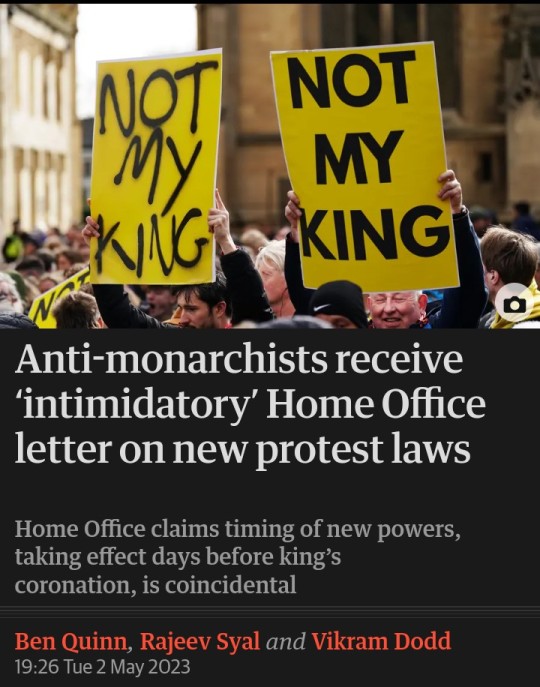


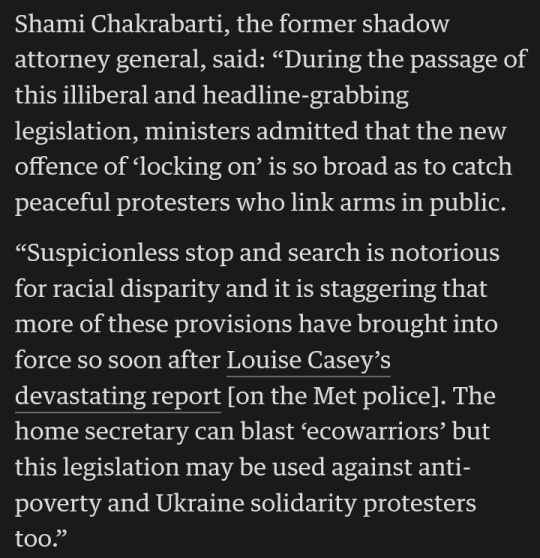
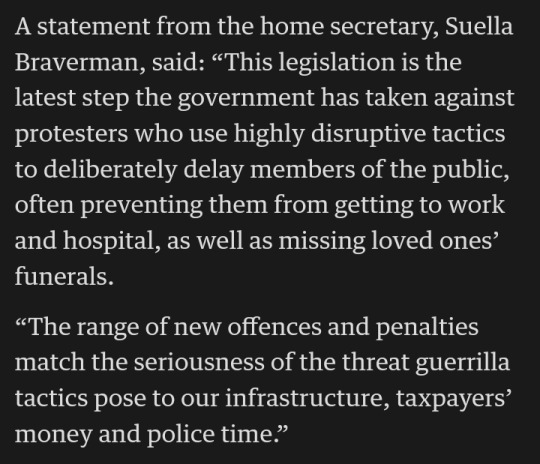
[alt text:]
Anti-monarchists receive ‘intimidatory’ Home Office letter on new protest laws
Home Office claims timing of new powers, taking effect days before king’s coronation, is coincidental
Ben Quinn, Rajeev Syal and Vikram Dodd
Official warning letters have been sent to anti-monarchists planning peaceful protests at King Charles III’s coronation saying that new criminal offences to prevent disruption have been rushed into law.
Using tactics described by lawyers as “intimidatory”, the Home Office’s Police Powers Unit wrote to the campaign group Republic saying new powers had been brought forward to prevent “disruption at major sporting and cultural events”.
The new law, given royal assent by Charles on Tuesday, means that from Wednesday:
Protesters who block roads, airports and railways could face 12 months behind bars.
Anyone locking on to others, objects or buildings could go to prison for six months and face an unlimited fine.
Police will be able to head off disruption by stopping and searching protesters if they suspect they are setting out to cause chaos.
Jun Pang, a policy and campaigns officer at Liberty, said: “Key measures in the bill will come into force just days before the coronation of King Charles – a significant event in our country’s history that is bound to inspire a wider national conversation and public protests. At the same time, the government are using a statutory instrument to bring draconian measures that the House of Lords threw out of the bill back from the dead, once again evading scrutiny and accountability.
“It’s worrying to see the police handed so many new powers to restrict protest, especially before a major national event. When the Police, Crime, Sentencing and Courts Act came into force, the police repeatedly misused them – in part because they simply did not understand them. Similarly, when Queen Elizabeth died, we saw police acting in inappropriate and heavy-handed ways towards protesters that violated their rights.”
Shami Chakrabarti, the former shadow attorney general, said: “During the passage of this illiberal and headline-grabbing legislation, ministers admitted that the new offence of ‘locking on’ is so broad as to catch peaceful protesters who link arms in public.
“Suspicionless stop and search is notorious for racial disparity and it is staggering that more of these provisions have brought into force so soon after Louise Casey’s devastating report [on the Met police]. The home secretary can blast ‘ecowarriors’ but this legislation may be used against anti-poverty and Ukraine solidarity protesters too.”
A statement from the home secretary, Suella Braverman, said: “This legislation is the latest step the government has taken against protesters who use highly disruptive tactics to deliberately delay members of the public, often preventing them from getting to work and hospital, as well as missing loved ones’ funerals.
“The range of new offences and penalties match the seriousness of the threat guerrilla tactics pose to our infrastructure, taxpayers’ money and police time.”
full article here
so just to sum this up, peaceful protesting can now land you in prison for a year and you might face an unlimited fine which i believe is up to £5000, and police can now stop and search you if they believe youre "setting out to cause chaos"
its specifically being put in place right before charles' coronation, but these are now considered criminal offenses so theyre not exclusive to it.
you know, a country where you can be put in prison for a year for peaceful protesting really doesnt sound like a fucking democracy to me.
#hell country#britpol#british politics#britain#king charles#coronation#uk politics#uk#uk police#suella braverman#charles windsor#the guardian#tories#tory government#conservatives#idk what to tag here#but fucking hell
9K notes
·
View notes
Text
Of Policies and Purges…
The General Election Campaigns Do Not Get Off To A Good Start

Source: The Independent
By Honest John
FROM RISHI Sunak's sodden announcement of a "snap" General Election for 4th July 2024, the first week and a half of the campaign for both parties has not exactly gone according to plan. Labour, having for months promoted a miserabilist offer that basically says "things are terrible under the Tories maybe they will be a tad better under us (maybe)" are now trying to inject some much needed urgency in their campaign with aggressive launches in safe Tory seats, a pledge card that isn't a pledge card promising, top of its list, a stirring commitment to "economic stability" and a genuinely eye-catching promise to reduce NHS waiting lists to their position in 2010 (18 weeks maximum wait from referral by GP to treatment), which implicitly commits the party to literally billions of pounds of investment in the health service in its first term. Despite claims from the Tories and the left that Labour have a minimal policy offer, behind the uninspiring pledges, there exists a recognisable and credible social democratic offer: £40bn of investment in green energy over its first term; nationalisation of rail; the most ambitious set of employer/employee reforms in favour of, for once, the workers, in 50 years; a major housebuilding programme; devolution of real political power to the English regions; removal of the hereditary Lords, and a commitment to a national economic strategy and plan, with structures to enable it to happen. All the above is a significant break with the laissez-faire neoliberalism that has dominated British politics since the 1980s. Those that claim the parties are "all the same" are being either disingenuous or are not keeping up.
So how is it that Labour has contrived to shoot itself so dramatically in both feet while carrying out one of most botched "purges" in political history (not so much Krushchev, more the Keystone Kops)? The whole sorry saga, exemplified most dramatically by the frankly indefensible treatment of Diane Abbott, hinges on an ill-advised attempt by the leadership to prevent anyone who might conceivably be considered on the left of the party (even if their commitment to international socialism consists of little more than 'liking' the wrong tweet), from standing for Labour regardless of Constituency shortlisiting, promises to candidates or even the fact that local leaflets bearing their photograph may already have been printed. Let's face it, any serious operation seeking to "purge the left" should have got the bloodletting and the trauma out of the way long before the election was called: to attempt to strongarm CLPs into accepting centrally approved candidates during the campaign itself, speaks of an amateurishness as well as a deadening intolerance at the heart of a party that still proclaims itself to be a broad church.
But if one feels limited sympathy for naive candidates who retweet anti-semitic tropes (although one must also ask, who is it going through their history looking for this stuff?), the Diane Abbott saga is little short of disgraceful. Here is a black, female MP, the recipient of near continuous online and face-to-face abuse of the most foul kind, who has been treated by a party she has belonged to her entire political life in the most humiliating and demeaning of manners. Abbott was suspended by Labour over 13 months ago following a letter on racism she sent to the Observer. Despite withdrawing the letter - which claimed black people endured a greater level of racism than Jews, Irish people or Travellers - and apologising in response to the resultant furore, Abbott was immediately suspended by the Labour Party on the grounds that the letter was anti-semitic, in that it denied that Jews suffered from racism. I have re-read Abbott's letter of couple of times. It is a clumsy, badly worded exercise in competitive identity politics, asserting that black people's experiences are somehow worse than other groups suffering prejudice - despite anti-semitism being objectively the most ancient and lethal racism of the lot. That makes it crass, provocative and divisive - but not intrinsically anti-semitic. However, an investigation was not in itself out of order: what is unacceptable is the unconscionable length of time it took the party to investigate a single document and the fact that it has emerged the investigation concluded six months ago, despite Keir Starmer claiming it was still "ongoing" as recently as this week. Labour then compounded its offence by allowing it to be briefed that even when the Labour whip was belatedly restored to Abbott, she still would not be allowed to stand as a Labour candidate at the election. Starmer has at last personally intervened to confirm Abbot is free to stand for Labour in Hackney and Stoke Newington, but the whole affair has left a nasty taste - a feeling that an act of vindictive sectarianism blew up in the leader's face, causing an abrupt climb-down. The impression is left is of a deeply unpleasant party, prepared to humiliate an MP who, next Parliamentatry term will be Mother of the House, in the interests of a ham-fisted purge. Along the way, Labour's new NHS commitments were lost in the noise of accusation and counter-accusation.
As for the Tories, their launch has resembled an incontinent Mad Hatter’s Tea Party. The Conservatives seem to have forgotten one of the most basic of political adages - have your Manifesto agreed and nailed down before the election campaign. Instead, Sunak has followed up his ambush of his own party when he announced the General Election date, with an ill-thought out commitment to a reintroduced National Service and an unfunded tax break to pensioners, leaving Tory ministers and spokespeople floundering in their attempts to answer what this reheated National Service actually means and trying to explain how the pensioner tax break won't increase the public spending cuts already announced by the Chancellor. Added to the culture wars previously, if unconvincingly, launched by the PM (attacks on disabled people; promising to get rid of "mickey mouse" degrees and the hardy perennial/ dead horse of the Rwanda scheme), the Tory campaign is disjointed and defensive - aimed at holding onto Conservative supporters and staunching the flow of right wing voters to Reform. However, for all Sunak's frenetic energy, the polls remain stubbornly against the Tories, with most commentators predicting a collapse in seats at the election to as few as 150 - a quite extraordinary result given Boris Johnson’s barnstorming victory less than five years ago. In the meantime, another MP defects to Labour (Mark Logan of Bolton North East), others announce their support for Reform and big beasts like Michael Gove and Andrea Leadsom add to the extraordinary number of Conservative MPs deciding not to contest the election. If Labour's campaign has been one of self-inflicted damage, the Conservatives’ operation appears to be falling apart before the voters' eyes. It is hard to think of another election in which the government of the day appears to have more or less given up, four weeks out from the election.
All this must be good news for Labour, and in terms of simple electoral success, of course it is. But there remains the issue of the cul-de-sac the party appears to have driven itself into when it comes to actually governing. Whereas aspects of Labour's programme do not require additional funding, if Labour do form the next government, much of the impetus behind voters' rejection of the Conservatives will come from their despair at the state of public services, run down to the extent many now barely function. The "change" that Labour promises, and the electorate want, is not simply that of a change of management, but a change in priorities and economic model, away from the market state and towards social solidarity and the protective state. However, sitting above Labour's ambitions to reset the nation lies the dead hand of Rachel Reeves' fiscal rule. All taxes rises have been ruled out, direct and indirect, with VAT recently joining the list of potential revenue sources shut off; unnerved by the Truss experience, additional borrowing has also effectively been closed down. All that is left to balance the country's finances are public spending cuts. Reeves has neither pledged to reverse Hunt's tax cuts or his reckless and unpopular abolition of National Insurance. This is in addition to the £22bn of revenue spending cuts already pencilled in by the Tories for 2025. Of course it is possible, and I truly hope it is, that later this year, a furrow-browed Starmer will tell us that the state of public services is such, that the fiscal rule will have to be dispensed with and both tax-raising and borrowing solutions will re-enter political discourse. Without this, there is little chance of Labour's Wilsonian project of national renewal getting past first base.
Successfully explaining to a disbelieving electorate that "change" may in fact, be no such thing, will take more than iron discipline, message control and a "changed party": it will require a minor miracle.
31st May 2024
#british politics#keir starmer#rishi sunak#labour#next general election#conservative government#labour party
2 notes
·
View notes
Note
did you see te pati maori declared independence??
I DID NOT! Holy shit! Thanks for the news!
Okay, now reporting back from one research deep-dive, the recent context as I understand it is this:
Last November, a conservative right-wing Prime Minister, Christopher Luxon, assumed office. He's got a lot of less than stellar right-wing policies, and that includes making cuts to the Ministry of Social Development and opposing co-governance with the Waitangi Tribunal and other Māori leadership organisations over the administering of public services such as education, health, and infrastructure. He's been openly critical of Māori seats in Parliament, though he hasn't (yet) opposed them. Over the course of his administration, there's been an initiative to omit or cut mentions of the Treaty of Waitangi, the foundational document of New Zealand that forms the basis of arguments for Māori protections, from official language.
Which brings us to yesterday, May 30th. Budget Day. The day the new administration would announce their first budget and a day of mass action for supporters of te Pāti Māori protesting the treatment of Māori under the new government. I don't have any concrete numbers, but RNZ reports thousands of protestors, while the NZ Herald estimates "tens of thousands" turning out nation-wide, and a walking protest that delayed rush-hour traffic in Auckland for hours.
You may have already guessed that the budget was Bad. As I understand it, the budget effectively cut any kind of targeted funding for Māori health or education, and decreased funding for Māori cultural festivals and celebrations. And again, I cannot stress enough how much I am not an expert on this topic, so there's probably a lot more in there I don't know about.
In response to the new budget, Māori Party MP Rawiri Waititi issued a Declaration of Independence to the New Zealand Parliament, (video of his speech in link) with the support of his fellow te Pāti Māori co-leader Debbie Ngarewa-Packer.
There doesn't seem to be any concrete plan in place yet for the organisation of the new Māori parliament, but MPs Waititi and Ngarewa-Packer met with protestors to collect signatures for the Declaration, which they plan to bring to a hui taumata (meeting of congress) today, Friday, May 31st. The text of the Declaration can be found on te Pāti Māori website, in the form of a petition. You do not have to be Māori to sign, but I believe you do have to be kiwi.
#damn this is exciting!!#I'm sure I don't understand the full context of what's happening right now#maybe the party is determined to see this through#maybe it's a show of Māori political power intended to force the coalition government out of its conservative nose-dive#I don't fucking know!!#but I am very hopeful and excited to see what kind of future te Pāti Māori intends for Aotearoa#fucking power move#indigenous rights#politics#Māori
2K notes
·
View notes
Link
Wow. I hope that one day she comes out of her shell enough to pluck up the courage to tell him what she really thinks of him.
#suella braverman#rishi sunak#tory party#tory government#british politics#british government#conservative party#conservative government
5 notes
·
View notes
Text
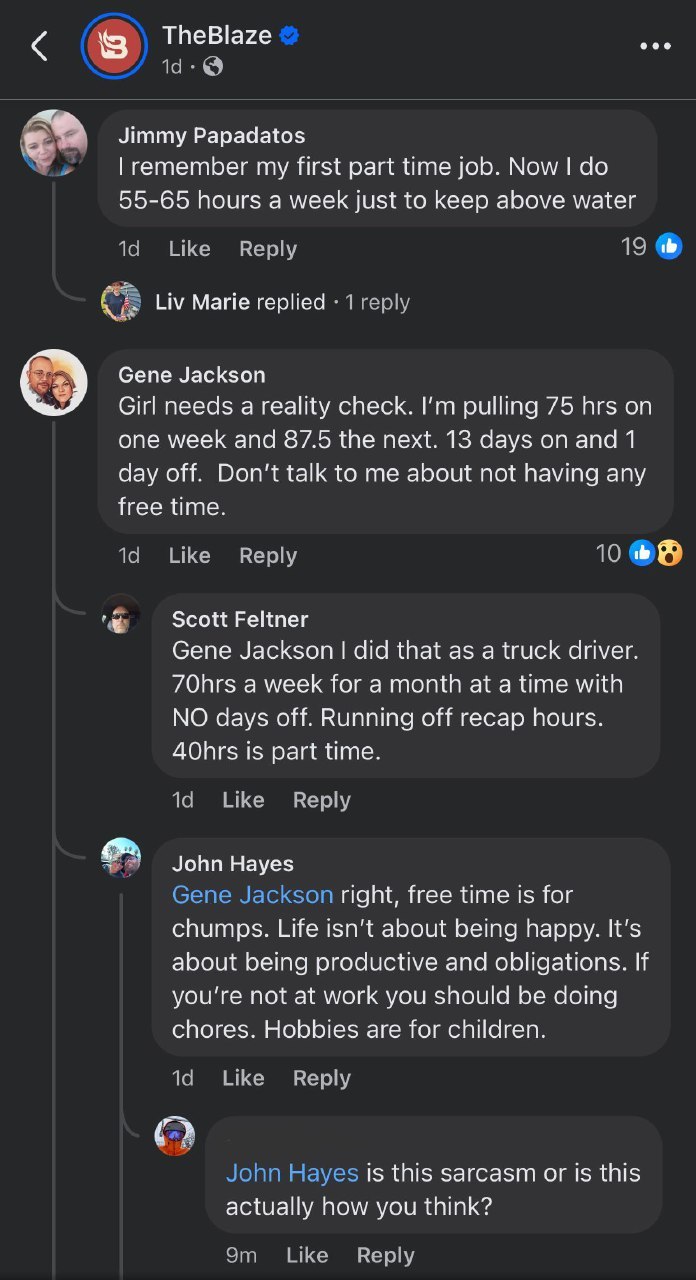
Conservatives have the most bizarre mindsets.
#Conservatives have the most bizarre mindsets.#conservatives#conservatism#conservativism#conservatives are morally bankrupt#ausgov#politas#auspol#tasgov#taspol#australia#fuck neoliberals#neoliberal capitalism#anthony albanese#albanese government
724 notes
·
View notes
Text

#nabj#vote blue#vote democrat#please vote#voting#election 2024#get out the vote#american politics#us elections#kamala harris#nabj24#nabj convention#conservatives#2024 presidential election#2024 election#fake news#oligarchy#government corruption#corporatism#corporations#vote kamala#kamala 2024#kamala for president#harris#president#presidential#election#unfit for office#trump is unfit#unfit
718 notes
·
View notes
Text
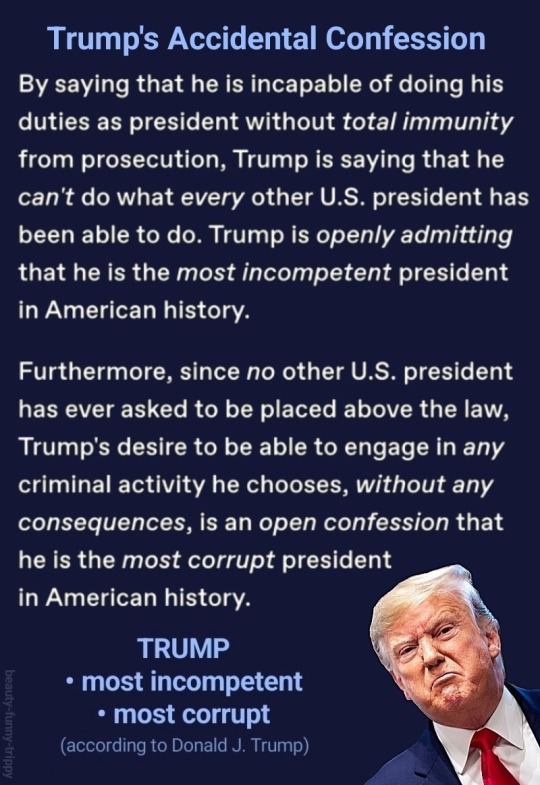
#donald trump#republicans#democrats#politics#democracy#government#us politics#America#trump#maga#vote#election#beauty-funny-trippy#aesthetic#American politics#anti-republican#anti-trump#GOP#conservatives#us elections#confession#confessions#incompetent#corrupt#immunity#immunity from prosecution
1K notes
·
View notes